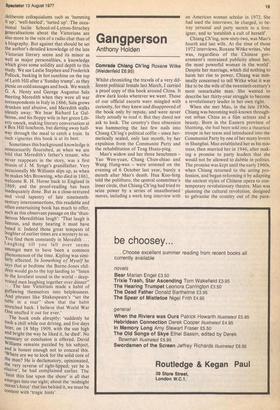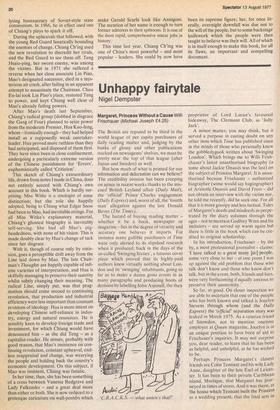Gangperson
Anthony Holden
Comrade Chiang Ch'ing Roxane WItke (Weldenfeld £6.95) Whilst chronicling the travels of a very different political female last March, I carried a proof copy of this book around China. It drew dark looks wherever we went. Those of our official escorts were mingled with curiosity, for they knew and disapproved of the book only by repute, and were never likely actually to read it. But they dared not ask to look. The country's then obsession was hammering the last few nails into Chiang Ch'ing's political coffin — since hermetically sealed, only last month, by her expulsion from the Communist Party and the rehabilitation of Teng Hsaio-ping.
Mao's widow and her three henchmen — Yao Wen-yuan, Chang Chun-chiao and Wang Hung-wen — were arrested on the evening of 6 October last year, barely a month after Mao's death. Hua Kuo-feng told the politburo, the central committee's inner circle, that Chiang Ch'ing had tried to seize power by a series of unauthorised moves, including a week long interview with an American woman scholar in 1972. She had used the interviews, he charged, to betray personal and party secrets to a foreigner, and to 'establish a cult of herself'.
Chiang Ch'ing, now sixty-two, was Mao's fourth and last wife. At the time of those 1972 interviews, Roxane Witke writes, 'she was, regardless of the Chinese government's restrained publicity about her, the most powerful woman in the world'. Despite her marriage, which did nothing to harm her rise to power, Chiang was minimally concerned to tell Witke what it was like to be the wife of the twentieth century's most remarkable man. She wanted to describe her thirty-year struggle to become a revolutionary leader in her own right.
When she met Mao, in the late 1930s, Chiang was becoming well-known throughout urban China as a film actress and a beauty. Born in the Eastern province of Shantung, she had been sold into a theatrical troupe in her teens and introduced into the Communist Party by one of her many lovers in Shanghai. Mao established her as his mistress, then married her in 1946, after making a promise to party leaders that she would not be allowed to dabble in politics. The promise was kept until the early 1960s, when Chiang returned to the acting profession, and began reforming it by adapting the ancient styles of Chihese opera to contemporary revolutionary theatre. Mao was planning the cultural revolution, designed to galvanise the country out of the para lysing bureaucracy of Soviet-style state communism. In 1966, he in effect used one of Chiang's plays to spark it off.
During the upheavals that followed, with the young Red Guard fanatically hounding the enemies of change, Chiang Ch'ing used the new revolution to discredit her rivals, and the Red Guard to see them off. Teng Hsaio-ping, her sworn enemy, was among the victims. But in 1971 she suffered a reverse when her close associate Lin Piao, Mao's designated successor, died in a mys terious air crash, after failing in an apparent attempt to assassinate the Chairman. Chou En-lai took Lin Piao's place, restored Teng to power, and kept Chiang well clear of Mao's already failing powers.
After Mao's death last September, Chiang's radical group (dubbed in disgrace the Gang of Four) planned to seize power from the moderate Premier, Hua Kuo-feng, whom -ironically enough they had helped install as a supposedly weak caretakerleader. Hua proved more ruthless than they had anticipated, and disposed of them first. They have since been in close confinement, undergoing a particularly extreme version of the Chinese punishment for 'Errors', euphemistically called 'Criticism'.
This sketch of Chiang's extraordinary life, drawn from notes I made in China, does not entirely accord with Chiang's own account in this book. Which is hardly surprising. Miss Witke is a sinologist of some distinction; but the role she happily adopted, being to Chiang what Edgar Snow had been to Mao, had inevitable strings. For all Miss Witke's explanatory material, Chiang's ghosted biography is inevitably self-serving. She had all Mao's pigheadedness, with none of his vision. This is made doubly clear by Hua's change of tack since her disgrace.
With it, though of course only by omission, goes a perceptible drift away from the Line laid down by Mao. The late Chairman's Thoughts are happily capable of infinite varieties of interpretation, and Hua is skilfully managing to preserve their sanctity whilst subtly changing their meaning. The radical Line, simply put, was that pragmatism should come second to continuing revolution, that production and industrial efficiency were less important than constant revisions of ideology. Hua is more intent on developing Chinese self-reliance in industry, energy and natural resources. He is sensibly keen to develop foreign trade and investment, for which Chiang would have denounced him as she did Teng as a capitalist-roader. He senses, probably with good reason, that Mao's insistence on continuing revolution, constant upheaval, endless reappraisal and change, was wearying the people and holding back the country's economic development. On this subject, if Mao was insistent, 'Chiang was fanatic.
In her time, then, she has been something of a cross between Vanessa Redgrave and Lady Falkender and a great deal more than either or both. She is now reclined to a grotesque caricature on wall-posters which make Gerald Scarfe look like Annigoni. The mention of her name is enough to turn former admirers to their spittoons. It is one of the 'host rapid, comprehensive smear jobs in history.
This time last year, Chiang Ch'ing was one of China's most powerful and most popular leaders. She could by now have been its supreme figure; her, for once literally, overnight downfall was due not to the will of the people, but to some backstage knifework which the people were then taught to believe was their will. All of which is in itself enough to make this book, for all its flaws, an important and compelling document.



































 Previous page
Previous page